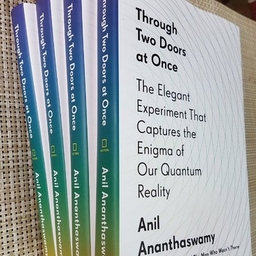
Anil Ananthaswamy
Journalist at Freelance
Sci journalist/TED speaker/MIT KSJ Fellow/Books: The Edge of Physics, The Man Who Wasn't There, Through Two Doors at Once / Mastodon: @[email protected]
Articles
-
1 month ago |
spektrum.de | Anil Ananthaswamy
Hintergrund Lesedauer ca. 13 Minuten DruckenTeilen Künstliche Intelligenz: Wie nah ist KI an menschlicher Intelligenz? KI-Modelle werden immer leistungsstärker und verblüffen mit ihren Fähigkeiten. Das heizt unter Fachleuten die Debatte an, ob eine künstliche allgemeine Intelligenz bevorsteht. Exklusive Übersetzung ausOpenAI stellt derzeit ein neues Sprachmodell nach dem anderen vor, jeweils begleitet von immer kühneren Versprechen.
-
2 months ago |
quantamagazine.org | Anil Ananthaswamy |Ben Brubaker |Webb Wright |Janna Levin
Language isn’t always necessary. While it certainly helps in getting across certain ideas, some neuroscientists have argued that many forms of human thought and reasoning don’t require the medium of words and grammar. Sometimes, the argument goes, having to turn ideas into language actually slows down the thought process. Now there’s intriguing evidence that certain artificial intelligence systems could also benefit from “thinking” independently of language.
-
2 months ago |
flipboard.com | Anil Ananthaswamy
NowA body language expert has entered the chat. Kylie Jenner and Timothée Chalamet were among the many celebrities vibing at Coachella, by which I mean they were spotted making out in the crowd. But according to body language expert Judi James, Kylie was doing the "heavy lifting" in their PDA. Judi …
-
2 months ago |
scientificamerican.com | Anil Ananthaswamy
Over the past decade, two very different ways of calculating the rate at which the universe is expanding have come to be at odds, a disagreement dubbed the Hubble tension, after 20th-century astronomer Edwin Hubble. Experts have speculated that this dispute might be temporary, stemming from subtle shortcomings in observations or analyses that will eventually be corrected rather than from some flawed understanding of the physics of the cosmos.
-
Mar 24, 2025 |
wired.jp | Anil Ananthaswamy
駅のホームに立って、トロッコが通過していくのを見ているとしよう。トロッコに乗った女の子が、真っ赤なボールを落とす。女の子から見ると、ボールはまっすぐ下に落ちる。だが、ホームに立つあなたからは、ボールは弧を描いてからトロッコの床に落ちるように見える。このとき、女の子はトロッコに固定され、あなたは駅のホームに固定されて、同じ事象を異なる基準系で観測しているのだ。 基準系という概念は、古典物理学の世界で長い歴史をもつ。アイザック・ニュートンからガリレオ、アルバート・アインシュタインまで、みなそれを土台にして運動の研究を進めた。基準系とは、それ自体が動く可能性のある座標系(「原点」となるゼロ点を基準にして、位置と時間を特定する方法)と考えればよい。アインシュタインは、基準系を利用して相対性理論を展開し、時間と空間は宇宙に対して固定されているのではなく、伸びたり縮んだり歪んだりする可塑性をもつ存在であることを明らかにした。...
Try JournoFinder For Free
Search and contact over 1M+ journalist profiles, browse 100M+ articles, and unlock powerful PR tools.
Start Your 7-Day Free Trial →X (formerly Twitter)
- Followers
- 13K
- Tweets
- 4K
- DMs Open
- No

RT @evisdrenova: Nightstand is goated rn https://t.co/meiMIejSW3

RT @anilananth: These days most writers, including me, get asked: "Will you use AI to help you write?" My answer is: No. Not because I'm in…

RT @HistPhilosophy: Look what came today! https://t.co/RSeeI08l7E https://t.co/IkFOmnhCjw
